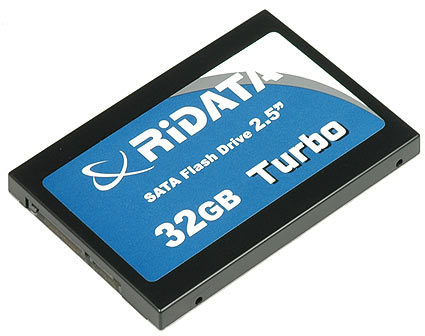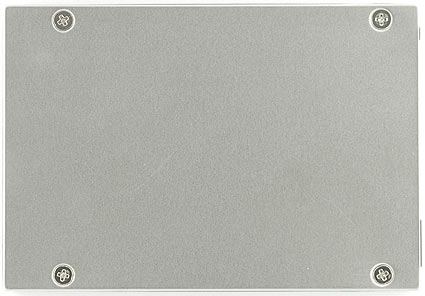Samsung, Ridata SSD Offerings Tested
Ridata 32 GB Turbo 2.5" SATA Flash Drive
The Ridata drive should be available now at a retail price of $699, which certainly isn't a bargain. But the price tag includes the latest-generation flash-based SSD, which utilizes a Serial ATA/150 interface and thus can be operated with virtually any PC or notebook. Like all other Flash SSDs we've received to date, the Ridata 32 GB Turbo SATA flash drive fits into a standard 2.5" form factor at a 9.5 mm height. The total weight of only 64 g make this product the lightest Flash SSD. Samsung's 32 GB UltraATA prototype was even lighter, but it was never sold in retail channels. The latest 64 GB product by Samsung is heavier, which can be attributed to the metal cover. Ridata sticks to a plastic enclosure to protect the flash chips and the controller.
Right now, Ridata offers the 32 GB version, but the vendor is ready to provide a 64 GB model early next year. You may find a 16 GB model by Ridata, but this one is not based on the same flash technology, and it comes in a 1.8" form factor with an UltraATA interface. Performance of that model is limited to less than 40 MB/s, while the 32 GB 2.5" Turbo drive we received did much better in our benchmark suite. While the 32 GB 2.5" Turbo drive's 0.5 ms average access time was five times longer than the access times we measured with other Flash SSDs, it's still much quicker than any mechanical hard drive available in retail markets.
The Turbo SSD by Ridata reaches a maximum read transfer rate of 57.2 MB/s, which drops to 50.5 MB/s as you throw more data on the drive. Sequential write performance is over 50% slower and remains between 26.8 and 20 MB/s. This is less than a mechanical drive can provide and is only half of the throughput we've seen with the SanDisk SSD5000, and roughly 1/3 of the Mtron drive's performance.
For some reason, the drive doesn't perform very well in the Windows XP Startup benchmark of PCMark05, and it also takes longer than the other Flash SSDs to start complex applications such as Adobe Photoshop CS3. The average access time, which is longer than the access time of other Flash SSDs, has its impact in the Webserver benchmark pattern of IOMeter, which requires the drive to deliver lots of small files. However, it does well in the fileserver and workstation tests and provided better performance than Samsung and Sandisk in the database I/O benchmark. But it is still worlds away from Mtron's 32 GB SSDs.
A look at the product features and specifications offers an explanation for the results, which may appear disappointing at first sight. Ridata says the device is reliable for critical industrial data storage applications and can withstand rough environmental conditions, involving dust, humidity and oil contamination. With a 0 - 70° C operating temperature range and a capacity of two million program and erase cycles, we believe that the software has also been sufficiently tailored so that the device can withstand the demands of harsh environmental applications.
Get Tom's Hardware's best news and in-depth reviews, straight to your inbox.
Current page: Ridata 32 GB Turbo 2.5" SATA Flash Drive
Prev Page Introduction Next Page Samsung 2.5" 64 GB SSD SATA
Patrick Schmid was the editor-in-chief for Tom's Hardware from 2005 to 2006. He wrote numerous articles on a wide range of hardware topics, including storage, CPUs, and system builds.

